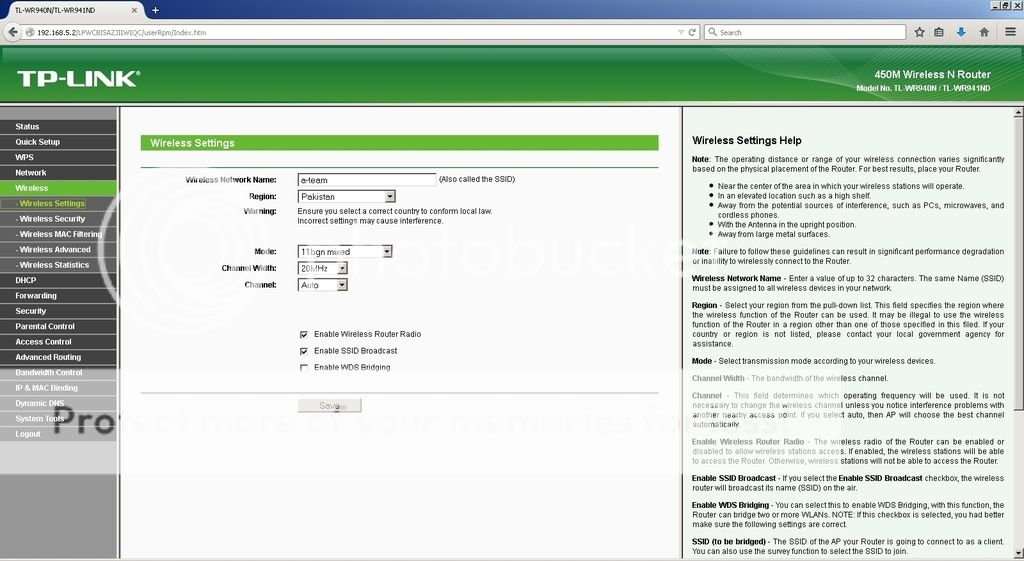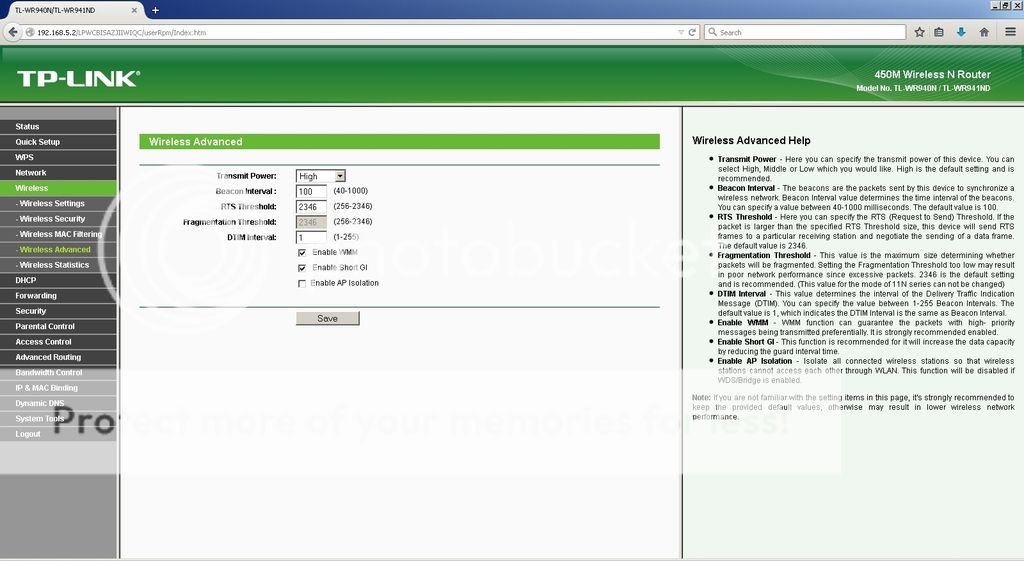Akbar Munir
New Around Here
Hi,
I am facing bit of an issue with my WiFi routers. Let me explain the setup here:
DSL (8 mbps)
|
|
WiFi Router 1 (W1) @ 1st Floor (My service provider's DSL Router) (192.168.5.1)
|
|
LAN
|
|
WiFi Router 2 (W2) @ Ground Floor (TP-Link WR940N) (192.168.5.2)
DHCP runs on W1, which is connected to DSL connection. DHCP has been turned off on W2. The LAN cable connects the LAN port on W1 to Lan port on W2. This configuration allows me to use W2 as AP only. The SSID on both W1 and W2 remains the same, along with the password. The WAN port on W2 is not connected.
The issue I am facing is slow WLAN and internet access, using either W1 or W2. If I connect my laptop to one of the LAN ports on W2 or W1, the access speed remains as per expectation. However, WiFi clients, when connected to W1 or W2 face erratic speeds for internet.
The ping from one of the clients to W2 is given below. Highly erratic ping responses are observed on the WiFi interface of W2. Please do note that this ping response to W1's LAN IP when I am connected to one of the LAN ports on W2 is less than 1 ms:
Reply from 192.168.5.2: bytes=32 time=627ms TTL=64
Reply from 192.168.5.2: bytes=32 time=34ms TTL=64
Reply from 192.168.5.2: bytes=32 time=54ms TTL=64
Reply from 192.168.5.2: bytes=32 time=2ms TTL=64
Reply from 192.168.5.2: bytes=32 time=389ms TTL=64
Reply from 192.168.5.2: bytes=32 time=2ms TTL=64
Reply from 192.168.5.2: bytes=32 time=559ms TTL=64
Reply from 192.168.5.2: bytes=32 time=2ms TTL=64
Reply from 192.168.5.2: bytes=32 time=434ms TTL=64
Reply from 192.168.5.2: bytes=32 time=2ms TTL=64
Reply from 192.168.5.2: bytes=32 time=529ms TTL=64
Reply from 192.168.5.2: bytes=32 time=3ms TTL=64
Reply from 192.168.5.2: bytes=32 time=464ms TTL=64
Reply from 192.168.5.2: bytes=32 time=2ms TTL=64
Reply from 192.168.5.2: bytes=32 time=519ms TTL=64
Reply from 192.168.5.2: bytes=32 time=535ms TTL=64
Reply from 192.168.5.2: bytes=32 time=2ms TTL=64
Reply from 192.168.5.2: bytes=32 time=479ms TTL=64
Request timed out.
Reply from 192.168.5.2: bytes=32 time=30ms TTL=64
Reply from 192.168.5.2: bytes=32 time=536ms TTL=64
Reply from 192.168.5.2: bytes=32 time=73ms TTL=64
Reply from 192.168.5.2: bytes=32 time=614ms TTL=64
Reply from 192.168.5.2: bytes=32 time=3ms TTL=64
Reply from 192.168.5.2: bytes=32 time=385ms TTL=64
Reply from 192.168.5.2: bytes=32 time=2827ms TTL=64
Reply from 192.168.5.2: bytes=32 time=3ms TTL=64
Reply from 192.168.5.2: bytes=32 time=19ms TTL=64
Request timed out.
Reply from 192.168.5.2: bytes=32 time=2542ms TTL=64
Reply from 192.168.5.2: bytes=32 time=446ms TTL=64
Reply from 192.168.5.2: bytes=32 time=18ms TTL=64
Reply from 192.168.5.2: bytes=32 time=470ms TTL=64
Reply from 192.168.5.2: bytes=32 time=411ms TTL=64
Reply from 192.168.5.2: bytes=32 time=59ms TTL=64
Reply from 192.168.5.2: bytes=32 time=1061ms TTL=64
Reply from 192.168.5.2: bytes=32 time=2845ms TTL=64
Reply from 192.168.5.2: bytes=32 time=2ms TTL=64
Reply from 192.168.5.2: bytes=32 time=369ms TTL=64
Reply from 192.168.5.2: bytes=32 time=2ms TTL=64
Reply from 192.168.5.2: bytes=32 time=439ms TTL=64
Reply from 192.168.5.2: bytes=32 time=2ms TTL=64
Reply from 192.168.5.2: bytes=32 time=482ms TTL=64
The inSSIDer snapshot is also given below. It does not appear to be having much interference on the radio channel.

Advice is required to troubleshoot what is wrong with this setup.
Regards,
Akbar.
I am facing bit of an issue with my WiFi routers. Let me explain the setup here:
DSL (8 mbps)
|
|
WiFi Router 1 (W1) @ 1st Floor (My service provider's DSL Router) (192.168.5.1)
|
|
LAN
|
|
WiFi Router 2 (W2) @ Ground Floor (TP-Link WR940N) (192.168.5.2)
DHCP runs on W1, which is connected to DSL connection. DHCP has been turned off on W2. The LAN cable connects the LAN port on W1 to Lan port on W2. This configuration allows me to use W2 as AP only. The SSID on both W1 and W2 remains the same, along with the password. The WAN port on W2 is not connected.
The issue I am facing is slow WLAN and internet access, using either W1 or W2. If I connect my laptop to one of the LAN ports on W2 or W1, the access speed remains as per expectation. However, WiFi clients, when connected to W1 or W2 face erratic speeds for internet.
The ping from one of the clients to W2 is given below. Highly erratic ping responses are observed on the WiFi interface of W2. Please do note that this ping response to W1's LAN IP when I am connected to one of the LAN ports on W2 is less than 1 ms:
Reply from 192.168.5.2: bytes=32 time=627ms TTL=64
Reply from 192.168.5.2: bytes=32 time=34ms TTL=64
Reply from 192.168.5.2: bytes=32 time=54ms TTL=64
Reply from 192.168.5.2: bytes=32 time=2ms TTL=64
Reply from 192.168.5.2: bytes=32 time=389ms TTL=64
Reply from 192.168.5.2: bytes=32 time=2ms TTL=64
Reply from 192.168.5.2: bytes=32 time=559ms TTL=64
Reply from 192.168.5.2: bytes=32 time=2ms TTL=64
Reply from 192.168.5.2: bytes=32 time=434ms TTL=64
Reply from 192.168.5.2: bytes=32 time=2ms TTL=64
Reply from 192.168.5.2: bytes=32 time=529ms TTL=64
Reply from 192.168.5.2: bytes=32 time=3ms TTL=64
Reply from 192.168.5.2: bytes=32 time=464ms TTL=64
Reply from 192.168.5.2: bytes=32 time=2ms TTL=64
Reply from 192.168.5.2: bytes=32 time=519ms TTL=64
Reply from 192.168.5.2: bytes=32 time=535ms TTL=64
Reply from 192.168.5.2: bytes=32 time=2ms TTL=64
Reply from 192.168.5.2: bytes=32 time=479ms TTL=64
Request timed out.
Reply from 192.168.5.2: bytes=32 time=30ms TTL=64
Reply from 192.168.5.2: bytes=32 time=536ms TTL=64
Reply from 192.168.5.2: bytes=32 time=73ms TTL=64
Reply from 192.168.5.2: bytes=32 time=614ms TTL=64
Reply from 192.168.5.2: bytes=32 time=3ms TTL=64
Reply from 192.168.5.2: bytes=32 time=385ms TTL=64
Reply from 192.168.5.2: bytes=32 time=2827ms TTL=64
Reply from 192.168.5.2: bytes=32 time=3ms TTL=64
Reply from 192.168.5.2: bytes=32 time=19ms TTL=64
Request timed out.
Reply from 192.168.5.2: bytes=32 time=2542ms TTL=64
Reply from 192.168.5.2: bytes=32 time=446ms TTL=64
Reply from 192.168.5.2: bytes=32 time=18ms TTL=64
Reply from 192.168.5.2: bytes=32 time=470ms TTL=64
Reply from 192.168.5.2: bytes=32 time=411ms TTL=64
Reply from 192.168.5.2: bytes=32 time=59ms TTL=64
Reply from 192.168.5.2: bytes=32 time=1061ms TTL=64
Reply from 192.168.5.2: bytes=32 time=2845ms TTL=64
Reply from 192.168.5.2: bytes=32 time=2ms TTL=64
Reply from 192.168.5.2: bytes=32 time=369ms TTL=64
Reply from 192.168.5.2: bytes=32 time=2ms TTL=64
Reply from 192.168.5.2: bytes=32 time=439ms TTL=64
Reply from 192.168.5.2: bytes=32 time=2ms TTL=64
Reply from 192.168.5.2: bytes=32 time=482ms TTL=64
The inSSIDer snapshot is also given below. It does not appear to be having much interference on the radio channel.

Advice is required to troubleshoot what is wrong with this setup.
Regards,
Akbar.




